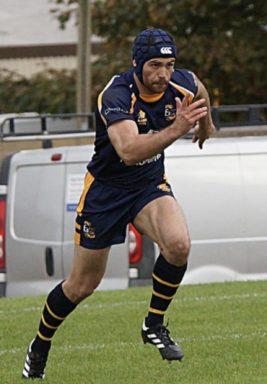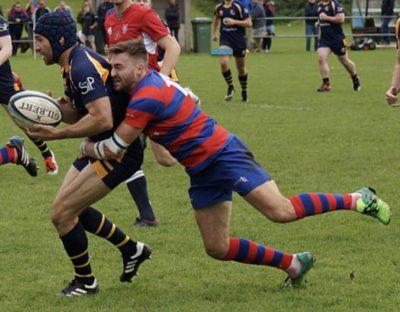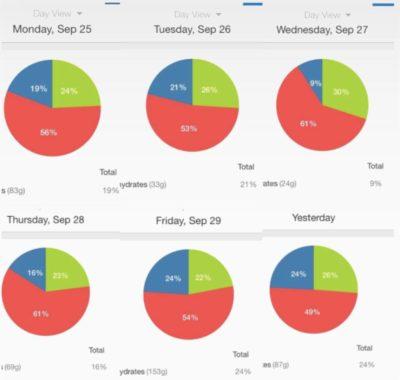
Ever since I was a young boy, sport has played an important role in my life. From growing up on sidelines in rural Ireland watching my dad play Gaelic football, to participating in a wide range of sports myself. I thought to myself - "I want to play sport forever". For me, organised sport has always been a great way to enjoy physical activity and to develop special friendships, some of which continue to blossom some 20 years later.
My sporting background
For me, nothing beats the buzz of being physically activity. Being physically active brings me so much happiness! Some people speak of that state of euphoria one can reach when exercising for a prolonged period of time when you feel as though you can run forever. I may have experienced this momentarilty once, but I don't chase it. My sporting abilities reached their peak in my mid to late teens, where I possibly relied on natural ability more than dedication. A story well known to so many.
I enjoyed success at regional levels in both rugby and Gaelic football and reached the national U-16 100 m sprint final. I trained hard and was focused on reaching optimal performance, but natural ability often helped me to get over the line when I could have prepared and performed better. My interests turned to rugby when I was in my teens and early adulthood, where I enjoyed playing throughout my medical school years and also playing at national level in Ireland, when working as a junior doctor. Although my natural strengths would suggest that I would be more suited to track and field sports, I prefer the deep social connections which I get from playing in the team sport environment. I really enjoy identifying and working towards shared goals, drawing from the different strengths of my teammates and working together for a shared purpose.
My previous high-carb approach
Like many people, I used to follow the standard approach to preparing for sport. "For sport you need carbs, simple"... or so I thought. 'Carb loading' was a weekly religion for me, and it didn't matter if I overate as 'I would just burn it off'. My meals were usually planned out to ensure that I was eating enough carbs and then I would add my protein and fat, but not too much, I didn't want to get fat... obviously! This was usually coupled with a series of sport supplements, from protein whey powders to pre-gym energy drinks which I thought was essential for me in order to help me to reach peak physical fitness. I needed these extra powders to be better. In hindsight I was a victim of advertising campaigns, targeting young men just like me, striving for peak physical performance and looking for quick fixes.
As the years progressed, I found myself performing worse instead of better. Surely I was doing something wrong. Was I not eating enough? Was I not training hard enough? I seemed to be eating the right food, but for some reason my performances seemed to be worsening rather than improving. Perhaps I was just getting older... I thought... at that time in my mid 20s! I was eating 3-4 meals per day, going to the gym 2-3 times per week and taking sport supplements on top. I ate regularly, as the last thing I wanted to do was lose muscle... This was what I though I needed to do.
When I look back at how I used to train and perform, I think of being mentally and physically sluggish, losing a few yards of pace each year, sticking to rigid meal plans and requiring more and more time to recover from training sessions and games. I used to be one of those guys who rushed into the gym or changing room to have my post-workout shake! I needed to eat every 3 hours and if I missed this window I would feel guilty as I was not giving my body the fuel it needed to prepare for physical activity... or so I thought. When I look back, each important game in my life has ended for me with delilitating cramping, resulting in be being unable to finish the game. I can remember this happening throughout my teens and into my 20s. Funnily enough, these games were often preceeded by heavy carb loading and drinking high-sugar energy drinks. The link never crossed my mind.
Seeing the light
During my general practice training, a break from organised sports was needed to allow me to focus on my General Practice and Sports Medicine studies. My eyes were opened to human biomechanics and exercise physiology among other subjects. However, it was my learning on sports nutrition which I enjoyed the most. I can remember one lecture by Dr. James Betts who has a passion for nutrition and metabolism in sport. After a long lecture, where many graphs and papers were referenced, I can always remember his parting statement... "having dedicated a decade of my life to understading sports nutrition and supplement usage, I can say that the best supplement for the non-professional athlete does not come from a tub, but has been used for centuries... it is called milk". This stuck with me and from that moment I began to look at sports nutrition differently. This led to further reading around the subject of nutrition in sport and I came across the works of Tim Noakes among others.
My new approach

Last year, I strapped my boots up and started playing rugby again. This time, I had a totally different approach to my perparation. Instead of focusing on eating meals at regular intervals and ensuring a consistently high carbohydrate intake, I focused on a diet with low refined carbohydrates and no supplements. I focused on nutrient density rather than calorie density.
The changes which I experienced on a low-carb diet were significant. I no longer felt sluggish. I had more mental clarity, I didn't get cramping. I didn't have mental fatigue during a game. I was getting faster instead of slower. This was all coupled with only going to the gym once per week, and focusing on flexibility and calisthenic work rather than lifting heavy weights. Interestingly, I now also lift heavier weights than I used to on my old diet and I no longer get the post-exercise muscle soreness that I used to - known as delayed onset muscle soreness (DOMS). I was now eating to fuel my body and to allow it to do what it is designed to do! No more supplements, no more protein whey powders, just simple whole food, and very little refined carbohydrates. By focusing more on my nutrition and less on my added supplements, I felt like a new man!
I no longer have rigid meal planning. I no longer eat every 3-4 hours. I sometimes train and go to the gym in a fasted state, and my performance is the same. My eyes have been opened. I have had many positive physical and mental improvements from changing my diet to a more low-carb approach. I am more lean, more flexible and recover more quickly. This has been found in the literature also ( Zin et al 2017) where endurance athletes experienced improved recovery time, improved skin quality, feeling more refreshed and enjoying food more. I certainly feel more mentally alert, have more thought clarity and can maintain this through my exercising where previously I would be more lethargic as matches progressed.
Negative experiences on low carb
I have had some negative experiences however, and it is important for me to share these with you. At times in my low-carb journey, I have got my preparations wrong, resulting in significant drops in performance and experiencing negative side effects. These experiences happened in the early days of my change in diet, where I trained and played in a keto state.
During these early experimental stages, I felt lethargic, had mental fog, and was unable to perform anywhere near my usual performance. These experiences may relate to the 'central fatigue' which can be associated with exercising in a keto state ( Chang et al 2017). In the past 18 months of this journey, this has only happened to me twice, where is used to be a regular occurence on a high-carb diet. The lesson that I learned from this was that I was not able to reach my performance needs on a pure low-carb or keto approach. Playing sports like rugby can put high energy requirments on my body, and I was not able to meet these intense energy demands on a keto diet alone.
I experienced, learned and adapted the approach to suit my needs. This is what the sports nutrition council state in their current recommendations - 'personalised nutrition plans' ( Burke 2015). There is no right or wrong for everyone, it is about finding out what works for you. Eating high quantities of refined carbs was certainly not allowing me to reach my performance goals, but cutting them out completely was also not helpful.

Train low and compete high(er)
Current guidelines for carbohydrate intake for athletes are poorly understood (Burke 2015), however there is a growing consensus among sport nutrition experts that high carbohydrate intakes are not promoted for all athletes. The current literature suggests that keto and low-carb diets can aid certain sport performances, mostly in the endurance and strength sports ( Chang et al 2017). While there is literature to support my physical and mental performance experiences, the sporting demands of my rugby matches required me to have more carbohydrate stores available (as glycogen) to meet the energy demands that I was putting on myself.
Identifying this, I have now adopted a carb-cycling approach. I live and train in a low-carb environment, and I perform in a state of higher-carb ingestion. This has been nicely explained by Dr. Brukner in his video on the Diet Doctor website. Training low and competing high(er). Having identified these needs, I can continue to reach and maintain my own lifestyle goals while meeting the increased demands of my rugby games.
Having once feared losing muscle mass when not regularly eating, I can relate to Dr. Jason Fung's findings of preserved lean muscle mass when fasting! Furthermore, the evolving model among experts suggests that athletes follow a personalised approach with carbohydrate intake periodised to fuel each workout as needed rather than to have consistently high-carbohydrate intake throughout the diet. In fact, modern sports nutrition experts avoid unncessary and excessive intake of CHO for athletes ( Burke 2015). Basically - find what works for you!
Out with the old and in with the new
Rather than eating high-carb meals throughout the week, I now have two meals which have refined carbohydrates in the 72 hours prior to my game and this allows me to perform at the desired level. This can simply be some brown rice or brown pasta along with my usual low-carb meal. I then revert back to my low-carb approach for the rest of the week, including days where I go to the gym or have training sessions. It could be seen as a case of having my cake and eating it! By eating a lower-carb diet for 95% of my meals, I continue to enjoy the benefits of a low-carb diet while also meeting the physical demands of my sport.
Here is an example of my low-carb approach. With my games on a Saturday, I increase my carbohydrate intake slightly on the Friday and the Saturday to 25% of total macronutrient intake.

My low-carb approach suits me. It helps me to reach my goals and to feel a lot healthier. I am playing rugby at a level which I have not enjoyed for many years and enjoying high physical and mental performances without the need of high carbohydrate foods or sport supplements. This approach is flexible, sustainable, fun and tasty! I am no longer a slave to carbohydrates, instead using the right food sources for me to reach my goals. It's not no carb, it's low carb! The guidelines are becoming more clear in their approach also - there is no universal approach to managing your carbohydrate intake, there is no simple way or simple truth.
Now that I am living in a low-carb life, I feel that there is nothing stopping me from continuing to participate at peak performance no matter how old I am. I am so pleased that I have found this new way of eating, and I look forward to learning, adapting and continuing to enjoy it as my exercise needs change over time.
Who knows, maybe I can play sport fovever!
Photo credit to Ann Brook.
Burke (2015) Re-Examining High Fat Diets for Sports Performance: Did we call the nail in the coffin too soon? Sports Medicine (2015) 45 (Suppl 1): S33-S49
Chang CK, Borer K, Lin PJ (2017) Low-Carbohydrate-High-Fat Diet: Can it Help Exercise Performance? Journal of Human Kinetics. Volume 56/2017, 81-92
Zin C, Wood M, Williden M, et al (2017)Ketogenic diet benefits body composition and well-being but not performance in a pilot case study of New Zealand endurance athletes. Journal of the Internartional Society of Sports Nutrition. 14:22, 2017

